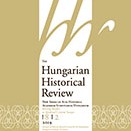 The Hungarian Historical Review (Web)
The Hungarian Historical Review (Web)
Proposals by: 15.12.2022
Over the course of the past few decades, many new studies focusing on the medical history of East Central Europe have been published, and today there is a growing body of secondary literature on the subject with strong theoretical underpinnings. A common thread of these analyses is that in the 19th and 20th centuries, medical knowledge was presented as an authoritative form of knowledge in the context of the various tendencies of modernity, and this knowledge was given an imperative role in upholding social, economic, and political orders, both in socialist and capitalist societies.
From the last decades of the 19th century onwards, closer cooperation with the state has secured doctors an increasingly prominent and socially prestigious function. This has meant, as a consequence of various processes through which the state has promoted certain forms of professionalization within the world of medicine, that the knowledge and forms of expertise of medical doctors have stood out in comparison to knowledge and forms of expertise of related professions. For the state, furthermore, cooperation with doctors offered new means of enforcing regulatory processes. These phenomena have been partly interpreted in medical historiography in the context of macro-level changes in the relations of production and their translation into the meso-levels and micro-levels of society, consequently giving rise (and currency) to visions of the primary social benefit of medical activity as a means of ensuring a large, healthy, productive labor force and preventing threats to civilizational harms (such as physical or mental illness). This approach, however, also risks reducing the medical gaze purely to an instrument of state control.
At the same time, however, there have been overarching ideological, temporal, and geographical pursuits that have focused on maintaining and expanding the autonomy of the medical profession and developing the institutional background in which this type of knowledge can be exercised (e.g., the development of … read more and source (Web).
